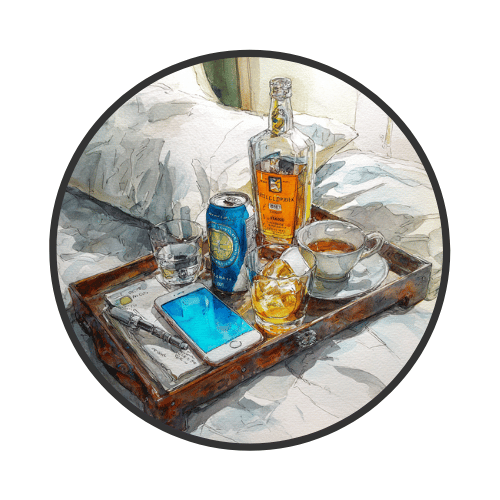11 Surprising Things You Didn’t Know Affect Your Sleep
Sleep is one of the most essential pillars of health, yet many individuals face challenges when it comes to getting enough hours of sleep at night. While stress, electronic devices, and packed daily routines are often cited as the main culprits, numerous overlooked factors could be disrupting your sleep quality. From environmental factors like bright lights and bedroom setup to internal ones such as the gut-brain axis or caffeine consumption, understanding these factors can pave the way for a better night’s sleep. With the right sleep hygiene and bedtime routine, you can combat sleep disturbances and achieve deeper, more restorative rest.
1. Your Bedroom Temperature
Did you know that your sleep environment plays a critical role in achieving a good night’s sleep? Research shows that maintaining your bedroom at a slightly cool temperature, ideally around 65°F (18°C), can significantly enhance sleep quality. When it’s too warm or too cold, it can lead to sleep disturbances, making it harder to stay asleep or enter deep restorative stages like REM. Adjusting environmental factors such as temperature is one of the simplest yet effective better sleep tips to improve how well you sleep at night.
2. The Connection Between Gut Health and Sleep
Your digestive system and brain are interconnected through the gut-brain axis, which means that issues in your gut can directly lead to sleep disturbances and affect your overall sleep quality. Incorporating foods rich in probiotics alongside natural options like peppermint or lemon balm can help maintain a healthy balance in your digestive system, promoting relaxation and supporting better sleep hygiene.
3. Evening Hydration (or Overhydration)
Drinking too little water before bed can lead to dehydration, causing discomfort that disrupts your sleep at night, while consuming too much may result in frequent trips to the bathroom. Striking the ideal middle ground is essential for maintaining sleep quality and minimizing sleep disturbances.
4. Light Exposure & Sleep
Your body’s internal clock, known as the circadian rhythm, is significantly influenced by light exposure. Bright lights from electronic devices, such as phones, tablets, or TVs, can interfere with melatonin release, making it harder to feel sleepy and disrupting your natural bedtime routine. Exposure to sunlight in the morning is essential, as it helps maintain a healthy sleep-wake cycle and improves overall sleep hygiene for a good night’s sleep.
5. Your Pillow and Mattress
The quality of your pillow and mattress is an often-overlooked factor when it comes to improving sleep quality and addressing sleeping problems. Many people experience sleep disturbances due to worn-out or unsupportive bedding, which can lead to discomfort, aches, and restless nights. Older adults, in particular, may be more prone to issues caused by improper sleep surfaces. To create a sleep environment that promotes a good night’s sleep, it’s essential to invest in a supportive mattress and pillow tailored to your specific needs. These environmental factors can make a significant difference in reducing sleep disruptions and enhancing overall comfort. Proper bedding, combined with other sleep hygiene practices, sets the stage for better sleep at night and fewer health problems related to sleep deprivation.
A surprisingly large number of people underestimate how much bedding choices contribute to sleep quality. A mattress that doesn’t provide proper support or a pillow that no longer aligns with your neck can lead to discomfort, disrupted sleep, and even long-term health problems. To tackle sleeping problems and promote a good night’s sleep, it’s essential to create a sleep environment with supportive bedding tailored to your needs. Proper sleep hygiene begins with investing in comfortable, durable sleep surfaces that help reduce sleep disturbances and improve overall rest.
6. Caffeine and Its Impact on Sleep
Caffeine is one of the most commonly used stimulants across the globe, but its influence on sleep quality often goes unnoticed. Popular sources such as coffee, tea, energy drinks, and even certain desserts can linger in your system for up to 6 hours or more, disrupting your circadian rhythm and making it challenging to get a good night’s sleep.
7. Alcohol and Its Impact on Sleep
While alcohol might initially make you feel drowsy and fall asleep faster, it significantly impacts sleep quality by disrupting restorative sleep stages, leading to frequent awakenings and leaving you feeling unrefreshed. To maintain a good night’s sleep, consider limiting alcohol intake several hours before bedtime, as part of an overall healthy bedtime routine and consistent sleep hygiene practices.
8. Substances That Impact Sleep Patterns
Substances like tobacco products, certain herbs, or recreational compounds can significantly impact your ability to get a good night’s sleep. Some may initially make you feel sleepy but later cause sleep disturbances by disrupting deep or REM sleep cycles, while others act as stimulants, delaying sleep onset and contributing to prolonged sleeping problems.
9. Impact of Medications and Supplements on Sleep
Certain medications and supplements can significantly influence sleep quality and contribute to sleep disturbances. For example, stimulants like pseudoephedrine, some antidepressants, and even high doses of vitamin B12 can interfere with your ability to fall asleep or stay asleep at night. On the other hand, natural aids such as magnesium, passionflower, and herbs that support GABA function may help promote relaxation and create a more conducive sleep environment. Understanding these factors affecting sleep is especially important for individuals experiencing sleeping problems or sleep deprivation, as these substances can either support or disrupt your path to a good night’s sleep. Always consult with a healthcare professional before making changes to your routine, especially when dealing with medications or supplements.
Some common medications and nutritional products may contribute to sleeping problems. Stimulants like pseudoephedrine, certain mood stabilizers, and large amounts of vitamin B12 can disrupt your circadian rhythm and lead to sleep disturbances. On the other hand, natural remedies such as chamomile, magnesium, and calming plant extracts may support a good night’s sleep and improve sleep quality.
10. Your Evening Habits, Routine, and Sleep Hygiene
Your bedtime routine plays a crucial role in determining your sleep quality and overall well-being. Activities that seem harmless, like scrolling through electronic devices, late-night snacking, or engaging in vigorous physical activity right before bed, can interfere with your circadian rhythm and lead to sleep disturbances. Instead, adopting better sleep tips—such as meditating, enjoying a light snack that supports the gut-brain axis, or reading under dim lighting—helps create a calming sleep environment. These habits signal your body it’s time to unwind, reducing the risk factors for sleeping problems and paving the way for a good night’s sleep.
11. The Link Between Nutrition and Sleep
What you eat can significantly influence your sleep quality and help resolve common sleeping problems. Consuming foods high in refined carbs or sugar can lead to blood sugar fluctuations, contributing to sleep disturbances and making it harder to stay asleep. However, incorporating foods rich in nutrients like magnesium, tryptophan, and healthy fats, such as leafy greens, nuts, seeds, and certain fish, can promote relaxation and encourage a good night’s sleep. Adding calming herbal teas—like lemon balm or passionflower—to your bedtime routine can also help older adults and those experiencing sleep deprivation set the stage for improved sleep hygiene and a more restful night.
Quick Tip: To improve your sleep quality, avoid heavy or spicy meals close to bedtime, as they can lead to sleep disturbances. Instead, try a small, nutrient-rich snack that supports relaxation, such as a handful of nuts or a piece of fruit. This can help address hunger without disrupting your circadian rhythm or causing discomfort during the night. If you’re feeling sleepy but struggling to fall asleep, consider examining factors affecting sleep, like your sleep environment or bedtime routine, to enhance your overall sleep hygiene.
Quick Tips for Improving Sleep at Night
- Maintain a slightly cool, quiet, and dark sleep environment to promote better sleep quality and reduce sleep disturbances.
- Follow a consistent daily routine for sleeping, aiming for the same bedtime and wake-up time every day, even on weekends.
- Be mindful of caffeine and sleep by avoiding caffeine-containing drinks or foods at least 6 hours before bed to improve your chances of a good night’s sleep.
- Explore natural ways to relax before bed, such as sipping on herbal teas like lemon balm, passionflower, or rooibos, which support the gut-brain axis and sleep.
-
Create a calming bedtime routine, free from electronic devices and bright lights, to support your circadian rhythm and help signal your body that it’s time to rest.
Key Takeaways for a Good Night’s Sleep
Sleep quality is shaped by numerous interconnected factors, including the gut-brain axis, light exposure, and the timing of caffeine or alcohol consumption. By recognizing and addressing these often-overlooked elements—such as establishing a consistent bedtime routine, reducing bright lights before sleeping, and fine-tuning your sleep environment—you can minimize sleep disturbances, improve sleep hygiene, and support a good night’s sleep that leaves you feeling refreshed and energized.







Leave a comment
All comments are moderated before being published.
This site is protected by hCaptcha and the hCaptcha Privacy Policy and Terms of Service apply.